We Are the Weather by Jonathan Safran Foer

Author:Jonathan Safran Foer
Language: eng
Format: epub
Publisher: Farrar, Straus and Giroux
V. MORE LIFE
Finite Resources
Returning from work one afternoon, my grandfather was stopped on the outskirts of his Polish village by a friend, who told him that everyone had been murdered and that he had to flee. “Everyone” included my grandfather’s wife and baby daughter. He wanted to turn himself in to the Nazis, but his friend physically restrained him and forced my grandfather to survive. After several years of running and hiding, exercising hysterical resourcefulness to evade the Germans, he met my grandmother, and they moved to Lodz, where they lived in an empty home whose previous occupants had been murdered.
Resourcefulness was the only quality that I heard attributed to my grandfather until a few years ago. He ran the black market of the displaced persons camp where he, my grandmother, and my mother spent their final months in Europe; traded currencies and precious metals; forged documents; hid his money in the carved-out heels of his shoes. In 1949, he and his young family boarded a ship to America with a suitcase that held ten thousand dollars in cash—today’s equivalent of more than one hundred thousand dollars. (They had more money than the American relatives who were taking them in.) Speaking little English, and unacquainted with American culture or business, he bought a series of small grocery stores, managed them, and then sold them for a profit. Such stories about him—and all stories about him were such stories—filled me with pride, as well as some embarrassment about my own relative lack of ingenuity.
Around the time my mother was six, my grandfather said he was going downstairs to get the store ready—they often lived above the groceries they owned—and hanged himself from one of the air-conditioning units. Just when the threats appeared to have cleared, his resourcefulness, his ability to survive anything, reached its limit. He was forty-four.
I didn’t know about my grandfather’s suicide until a series of somewhat accidental discoveries a decade ago. Clearly an earlier confrontation with the truth wouldn’t have changed any of the facts, but it might have spared my family unnecessary shame and the guilt that incubated in the silence.
To some extent, we all knew what we didn’t know. Or we knew but didn’t believe, and in that way didn’t know.
My mother recently told me that she remembers when her father tucked her in for the last time. “He kept kissing me and telling me that he loved me in Yiddish.”
She believes that while he suffered from clinical depression, his suicide was triggered by a failed business venture, which would encumber the family with extreme debt—the shame of leaving his wife and children without enough resources compelled him to take away their greatest resource.
Maybe resourcefulness really did define him so completely. Or maybe that description was a powerful act of repression, avoiding a truth by asserting its opposite. Maybe “resourceful,” counterintuitively, is a description of someone who survives with very few resources. Or maybe it is a description that means nothing at all, given to someone who was hardly known—another way of saying “he lived.
Download
This site does not store any files on its server. We only index and link to content provided by other sites. Please contact the content providers to delete copyright contents if any and email us, we'll remove relevant links or contents immediately.
The Secret History by Donna Tartt(16624)
The Social Justice Warrior Handbook by Lisa De Pasquale(11489)
Thirteen Reasons Why by Jay Asher(7788)
This Is How You Lose Her by Junot Diaz(5773)
Weapons of Math Destruction by Cathy O'Neil(5037)
Zero to One by Peter Thiel(4824)
The Myth of the Strong Leader by Archie Brown(4789)
Promise Me, Dad by Joe Biden(4447)
Beartown by Fredrik Backman(4419)
Stone's Rules by Roger Stone(4415)
How Democracies Die by Steven Levitsky & Daniel Ziblatt(4399)
The Fire Next Time by James Baldwin(4343)
100 Deadly Skills by Clint Emerson(4079)
A Higher Loyalty: Truth, Lies, and Leadership by James Comey(4033)
Rise and Kill First by Ronen Bergman(4012)
The David Icke Guide to the Global Conspiracy (and how to end it) by David Icke(3882)
The Farm by Tom Rob Smith(3872)
Secrecy World by Jake Bernstein(3782)
The Doomsday Machine by Daniel Ellsberg(3731)
